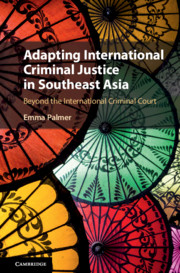Book contents
- Adapting International Criminal Justice in Southeast Asia
- Adapting International Criminal Justice in Southeast Asia
- Copyright page
- Dedication
- Contents
- Tables
- Acknowledgements
- Cases, Laws, and Treaties
- Abbreviations
- 1 Localising International Criminal Justice in Southeast Asia
- 2 Engaging with International Criminal Law alongside an Internationalised Tribunal
- 3 Implementing International Criminal Justice
- 4 Engaging with International Criminal Law as a Non-State Party
- 5 International Criminal Justice in ‘Transition’
- 6 Adapting International Criminal Justice in Southeast Asia
- Book part
- References
- Index
3 - Implementing International Criminal Justice
The Philippines
Published online by Cambridge University Press: 28 April 2020
- Adapting International Criminal Justice in Southeast Asia
- Adapting International Criminal Justice in Southeast Asia
- Copyright page
- Dedication
- Contents
- Tables
- Acknowledgements
- Cases, Laws, and Treaties
- Abbreviations
- 1 Localising International Criminal Justice in Southeast Asia
- 2 Engaging with International Criminal Law alongside an Internationalised Tribunal
- 3 Implementing International Criminal Justice
- 4 Engaging with International Criminal Law as a Non-State Party
- 5 International Criminal Justice in ‘Transition’
- 6 Adapting International Criminal Justice in Southeast Asia
- Book part
- References
- Index
Summary
The Philippines signed the Rome Statute on 28 December 2000, adopted legislation to incorporate international crimes into domestic law in 2009, ratified the Rome Statute in 2011, and withdrew in 2018 (effective in March 2019). Institutional developments, the passage of laws, and public statements by Philippine leaders in the past indicated support for (and implementation of) the norm of international criminal justice. However, the lack of enforcement of the Philippines’ international crimes legislation and events since President Rodrigo Duterte took office suggest that the government of the Philippines has certainly not accepted the norm of international criminal justice. Rather, debate continues. This chapter outlines the ongoing saga of international criminal justice in the Philippines. It then explores how government and civil society actors have used their experiences and initiative to debate the laws and institutions for investigating and prosecuting alleged international crimes in the Philippines. The chapter analyses the key features of these mechanisms, which continue to be discussed and developed. It shows how approaches to international criminal justice in the Philippines have involved dynamic interactions and adaptation.
Keywords
- Type
- Chapter
- Information
- Adapting International Criminal Justice in Southeast AsiaBeyond the International Criminal Court, pp. 72 - 113Publisher: Cambridge University PressPrint publication year: 2020

